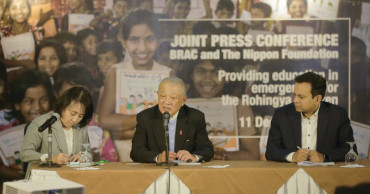Rohingya children
Severe malnutrition among Rohingya children surge by 27%: Unicef
The number of Rohingya children needing emergency treatment for severe acute malnutrition in Bangladesh's refugee camps has surged by 27 per cent in February 2025 compared to the same period last year, according to Unicef.
In Cox’s Bazar, home to over one million Rohingya refugees, including more than 500,000 children, malnutrition levels have reached emergency levels. Over 15 per cent of children in the camps are now malnourished—the highest rate recorded since the mass displacement of Rohingya refugees in 2017.
Unicef reported providing lifesaving treatment to nearly 12,000 children under five last year, with a 92 per cent recovery rate. However, without urgent intervention, severe acute malnutrition can be fatal.
The crisis is worsening, with January 2025 witnessing a 25 per cent rise in severe malnutrition cases year-on-year (from 819 to 1,021 cases), followed by a 27 per cent increase in February (from 836 to 1,062 cases).
This rise is attributed to prolonged monsoon rains in 2024, deteriorating sanitation, spikes in severe diarrohea, cholera and dengue outbreaks, intermittent food ration cuts, and a recent influx of families fleeing violence.
Japan, Unicef sign $ 3.3mn deal to strengthen assistance for Rohingya children
Unicef Representative in Bangladesh, Rana Flowers said, “For now, we can provide the services that Rohingya mothers come seeking, and that very sick children need, but as needs keep rising and funding declines, families are telling us they are terrified of what will happen to their babies if there are further food ration cuts and if lifesaving nutrition treatment services stop.”
Unicef estimates that 14,200 children in the camps will suffer from severe acute malnutrition in 2025. This figure could rise with further food ration cuts, poor diets, or reduced access to safe water and health services.
Malnourished children are 11 times more likely to die than their well-nourished peers without timely treatment.
“These families cannot yet safely return home, and they have no legal right to work, so sustained humanitarian support is not optional – it is essential,” said Flowers. “Unicef is determined to stay and deliver for children, but without guaranteed funding, critical services will be at risk.”
11 months ago
Covid-19: Over 1 lakh Rohingya children vaccinated in Bangladesh
More than 110,000 Rohingya children and adolescents living in the camps in Cox’s Bazar have received their first jab against COVID-19, said the UN refugee agency on Sunday.
They have been vaccinated as part of the National Vaccination Plan from the government of Bangladesh with support of UNHCR, WHO, UNICEF and other humanitarian partners.
“Bangladesh is one of the first countries worldwide to vaccinate refugee children and adolescents,” said Johannes Van Der Klaauw, UNHCR Representative in Bangladesh.
Also read:WB to provide Tk 255 cr as food aid to Rohingyas: State Minister
3 years ago
Bangladesh considers continuation of learning of Rohingyas under Myanmar curriculum
Bangladesh says it considers continuation of learning under Myanmar curriculum as an effort to keep the children engaged in productive and capacity building activities which would work as incentive for their early voluntary repatriation.
"Prolonged presence of a huge number of persecuted people entails serious ramification on the economy, environment, security, and socio-political stability of Bangladesh and beyond," said the Ministry of Foreign Affairs in a press statement on Thursday regarding misrepresentation of Bangladesh government’s arrangement of learning facilities for the Rohingya children.
The government says it appreciates the international community's cooperation to facilitate early, sustainable, and voluntary repatriation of the Rohingya to their ancestral land in Rakhine State of Myanmar and it is also the expectation of the Rohingya.
The government of Bangladesh places great importance on ensuring access to education for all especially for girls and in a similar vein.
Also read: Rohingya boy drowns in Bay of Bengal
The government is facilitating learning activities for the Rohingya children inside the camps.
However, it is of deep concern that disinformation is being propagated about the learning facilities for the Forcibly Displaced Myanmar Nationals (FDMN) or Rohingya children when the government of Bangladesh is working with the UN agencies to gradually bring learning facilities under Myanmar curriculum, streamline the volunteer teacher’s engagement and adopting policies for their capacity building, MoFA said.
Reports of closure of learning facilities, barring teachers or students to attend there are false and fabricated, it said.
The government of Bangladesh has arranged learning scopes for the Rohingya children inside the camps through around 5617 learning facilities all of which are in operation and neither Education Sector Operators in Rohingya Camps nor UNICEF (lead agency for education) raised any concern about closing any learning facility.
The FDMN children study under the UNICEF and BRAC developed curriculum called ‘Learning Competency Framework and Approach (LCFA)’ in the camps completely free of charge. Since the end of last year, a pilot project, called Myanmar Curriculum Pilot (MCP), has been rolled out in Rohingya camps which follows Myanmar curriculum and is conducted primarily in Myanmar language.
"It would gradually replace the LCFA. UNICEF is the lead agency to roll out the Myanmar curriculum inside the camps free of charge in the learning centers in a phased manner for grades one to twelve," MoFA said.
The government bodies with the support of the UN agencies are arranging learning in accordance with Myanmar curriculum which would allow every participant to continue to be exposed to their culture, mother tongue, and national identity.
It would facilitate reintegration in their ancestral society in Rakhine State smoothly upon their voluntary return, MoFA said.
Besides, it said, students in need of special help like the disabled, or adolescent girls who face difficulties attending learning centers because of the conservative mindset of their families, can attend alternate learning facilities described as community-based learning centers.
"Learning in those centers can also take place exceptionally in the event of medical emergencies, or natural disasters."
Rohingya volunteer teachers are conducting teaching and additional volunteers are being engaged and being trained to teach the Myanmar curriculum.
The host community representatives may be recruited for subjects that cannot be taught by Rohingya volunteers under Myanmar Curriculum, MoFA said.
The government of Bangladesh and the UN is finalizing a policy to further streamline the volunteer teachers' engagement and make it more fruitful.
Also read: Perpetrators must account for vicious crimes against Rohingya: UN
"As the Myanmar curriculum rolls out at different grades, efforts should continue to ensure a standard curriculum is taught to all students, and to ensure education is provided to Rohingya refugees free of charge and no disparity is created among FDMN children in the name of education. To ensure that the government of Bangladesh discourages operation of any private coaching centers or Moktobs inside the camps where learning activities are conducted in exchange of money, does not necessarily follow the Myanmar Curriculum or is even suspected to spread ideologies with ulterior motives."
Dropout rates in the established learning centers are increasing due to the unexpected operation of those coaching centers.
Promotion of such coaching centers would turn learning into a business commodity, MoFA said.
Following the Covid-19 related global health advisories, the learning centers were suspended in the highly congested Rohingya camps and were reopened as pre-covid conditions as the corona virus situation improved.
Now all the educational facilities are running on a regular basis like other educational institutions of Bangladesh.
Besides, schools and offices remain closed on weekends and national holidays globally.
Covid-19 induced suspensions and enjoying holidays on weekends or government holidays, suspension of unauthorised business ventures in the name of education should not be treated as an effort to impede learning facilities for Rohingya children, MoFA said.
3 years ago
Myanmar curriculum pilot reaches first 10,000 Rohingya children in Cox’s Bazar: UNICEF
A breakthrough for Rohingya refugee children living in the Cox’s Bazar refugee camps in Bangladesh sees the first 10,000 children enrolled to receive education based on the national curriculum of their home country Myanmar, says UNICEF.
This milestone will be reached this month, said the UN agency on Sunday.
The Myanmar Curriculum Pilot, launched by UNICEF and partners in November 2021, is a critical step forward towards ensuring the fundamental right to education for Rohingya refugee children. It will help prepare the children for their return to Myanmar.
“There is a tremendous demand for education among Rohingya refugee children, and UNICEF and partners are on the ground in the camps, responding to that demand,” said Sheldon Yett, UNICEF Representative to Bangladesh.
There are over 400,000 school-aged Rohingya children in the Bangladesh refugee camps.
With approximately 300,000 of these children attending learning centres, UNICEF and partners are running a mammoth education operation in what is the largest refugee settlement in the world.
There are 3,400 learning centres across multiple camps, of which 2,800 are supported by UNICEF.
To date, most of the children have been learning through the so-called Learning Competency Framework Approach (LCFA), which covers levels one to four and caters primarily to children aged 4-14.
The LCFA was created as an emergency measure for Rohingya refugee children and is a largely informal learning system.
The curriculum that is now being piloted is based on the Myanmar national curriculum, and it provides Rohingya refugee children with formal and standardized education.
In addition, the Myanmar Curriculum fills a critical secondary education gap: It provides schooling also for older children who have largely lacked access to education.
The Myanmar Curriculum Pilot initially targets 10,000 children in grades six to nine.
In normal circumstances, grades six to nine cater to children aged 11-14.
However, many Rohingya refugee children have fallen behind in their education, and so most children enrolled in grades six to nine are aged 14-16.
UNICEF aims to scale up in phases so that by 2023, all school-aged children are taught through the Myanmar curriculum.
Despite much progress, approximately 100,000 school-aged Rohingya refugee children are not in school, said the UN agency.
UNICEF and partners are working to reach out to these children and to remove the barriers that prevent them from going to school.
Private and community-based learning facilities that meet the needs of both boys and girls, and which are operated with sufficient oversight, could also play a role in providing educational services.
UNICEF engages with all stakeholders who play a role in the effort to provide Rohingya refugee children with equitable and inclusive access to standardized education.
“We need to do all we can to give these children hope, to provide them with education, to prepare them for their futures in Myanmar. UNICEF will continue to work with the Rohingya refugee community, the Government of Bangladesh and partners until every refugee child is reached with quality education,” said Yett.
3 years ago
BRAC takes initiative for protection of children of Rohingya, host communities
BRAC, a development organization, has taken an initiative for the protection as well as the mental growth of children of the Rohingya and host communities through play amid Covid-19.
Speakers disclosed this at a workshop at a hotel in Cox’s Bazar district town.
Child Protection Sector under Humanitarian Crisis Management Programme (HCMP) of BRAC organized the event titled ‘Lesson Learn Workshop’ on recently, Brac said on Wednesday.
The workshop was held for evaluating the achievement of child protection and chalking out future steps for achieving the objective in the next year (2022).
READ: Let Rohingya children live as full members of society: Unicef
Hasina Akhter Huq, Area Director of HCMP of BRAC; Roberts Sila Muthini, Programme Head of HCMP; Syeda Sazia Zaman, Programme Head of BRAC IED; Riffat Jahan Nahreen, Team Lead of Child Protection Sector under HCMP; and others spoke at the event.
4 years ago
Rohingya children must be educated in their own language: FM
Foreign Minister Dr AK Abdul Momen has reiterated Bangladesh's position to provide education to Rohingya children sheltered in the country only in Rohingya language under Myanmar curricula.
The Rohingya children can be reintegrated in Myanmar smoothly after their repatriation if they are educated in Rohingya language under Myanmar curricula, he said.
"This (education) must be done in Rohingya language under Myanmar curricula so that once they return, they can be reintegrated in Myanmar," Dr Momen conveyed to Canadian Minister of International Development Karina Gould during his recent virtual meeting.
Also read: Vaccination: UNHCR lauds Bangladesh for inclusion of Rohingyas
More importantly, he said, Canada should first introduce her education programme in Rakhaine State where nearly 6 lakh Rohingyas are in IDP camps.
4 years ago
Let Rohingya children live as full members of society: Unicef
Unicef has renewed its call on all relevant parties and governments to ensure a long-term solution where Rohingya children and their families should be able to live as full members of society in peace and harmony with their neighbours back at home in Myanmar.
“Amidst this latest round of displacement, Unicef urges the international community to step up its funding support for their immediate as well as longer-term needs," said Unicef Executive Director Henrietta Fore in a statement on Friday on the recent fire at Rohingya camps in Cox’s Bazar.
Fore said the fire is only the latest tragedy to hit Rohingyas and it has now been almost four years since 725,000 people were forced to flee their homes in Myanmar, bringing with them tales of unspeakable horror.
Unicef’s partners have delivered emergency water, sanitation and hygiene supplies and water services to the camps.
"Our mobile medical teams are providing first aid support to people who have suffered burns, cuts and other injuries," Fore said.
Unicef offered its deepest condolences to the families of Rohingya refugees killed and injured by the fire in Cox’s Bazar, Bangladesh, as well as to the 50,000 refugees – half of whom are children – displaced by the disaster.
“The fire, which quickly spread across four Rohingya refugee camps on March 22, is believed to have claimed the lives of at least 11 people, including 3 children. Over 50 children remain separated from their families and 300 people are unaccounted for," Fore said.
As firefighters extinguish the last embers of the blaze, Unicef teams are on the ground responding to the needs of children and families.
Also read: Dhaka seeks global community's constructive role in early Rohingya repatriation
"Our teams have already reported that over 140 learning centres have been destroyed, while water supply and sanitation systems have sustained significant damage," Fore said.
The Unicef Executive Director said their most urgent priority is to ensure the safety and protection of affected children, in coordination with local authorities.
Also read: South, Southeast Asian govts urged to rescue Rohingyas stranded at sea
"Unicef community volunteers are working to reunite separated children with their families and support relocation efforts for families whose shelters have been destroyed. Unicef has also set up child-friendly spaces, providing hundreds of children with psychosocial support," Fore said.
4 years ago
75,971 Rohingya babies born in last three years: Save the Children
Save the Children has said an estimated 75,971 children under three years or nine percent of the total Rohingya population are now living in the Rohingya camps in Cox’s Bazar district.
5 years ago
Rohingya children bearing brunt of COVID disruptions: UNICEF
The COVID-19 pandemic continues to disrupt life for more than 460,000 Rohingya children living in Cox’s Bazar district, says UNICEF on Monday.
5 years ago
US$ 2mn to be spent on education of Rohingya children
The Nippon Foundation, a Japanese private non-profit organisation, has donated around US$ 2 million (over Tk 17 crore) for Brac to scale up its education programme for Rohingya and host community children in Cox’s Bazar.
6 years ago



.jpg)









